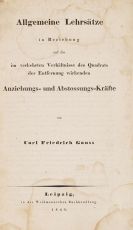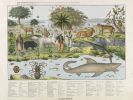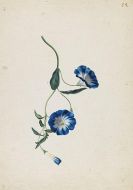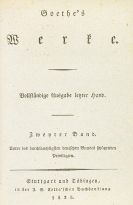
Philipp Otto Runge
Wolgast
1777 -
Hamburg
1810
Philipp Otto Runge was born on July 23, 1777 as the ninth of ten children in Wolgast (West Pomerania). His parents, the shipping company owner and merchant Daniel Nicolas Runge and Magdalena Dorothea Runge were wealthy protestant townspeople. As a boy Runge was often ill. At the Wolgast town school, which he attended from 1789, he was intellectually challenged by his teacher Gotthard Ludwig Kosegarten, who introduced him to "Sturm und Drang" and Classical literature and philosophy. After school, where his artistic talent had already been identified by Kosegarten, Runge began an apprenticeship as a merchant in Hamburg in 1795.
His brother Daniel introduced him to young poets and art lovers in Hamburg. From 1797 Philipp Otto Runge took drawing lessons under Joachim Herterich. His yearning to become a painter grew. He received instructions in drawing from Gert Hardorff the Elder and in oil painting from Dietrich Eckhart.
From 1799 he studied at the Copenhagen art academy. During his studies Runge met Friderike Brun, who considerably influenced Runge with her art collection and her circle of friends. In 1801, towards the end of his studies, Philipp Otto Runge returned to Wolgast. In Greifswald, he met Caspar David Friedrich in person, but in June Runge moved on to Dresden, where he worked as an independent artist on drawings and studies. He also studied Italian Renaissance and Dutch painting in Dresden, and met the 15-year-old Pauline Bassenge. A further important point in Runge's life was his participation in a competition for the "Propyläen" under the chairmanship of Goethe. The brusque refusal letter he received as a reply to his entry, reinforced his negative attitude towards Classicism and Historicism as art genres for good.
In 1803 Philipp Otto Runge's father finally allowed him to get engaged to Pauline Bassenge, after he had denied his blessings on their engagement once before. During this time, Runge produced several important drawings and portraits. On April 3, 1804, the long desired wedding took place in Dresden, from where the newly weds went on to Hamburg and Runge's artistic career continued. He painted a portrait of Pauline wearing a green dress and other pieces. In April Runge's son Sigismund was born, this event introduced a very productive phase of Runge's career. He painted numerous large-format pictures, including "The Hülsenbeck Children". One year later the Runge family returned to Wolgast, where Philipp Otto Runge continued to work on etchings.
His contact to Goethe intensified and he began developing his color theory. The Napoleonic war and the occupation of Pomerania and Hamburg prevented the Runge family from returning to Hamburg until 1807, when their daughter Maria Dorothea was born in the Hanseatic city. During the subsequent time Runge intensified his studies of the "color sphere" and the success of his etched drawings enabled him to contribute to projects like the "Zeitung für Einsiedler", which was published by Bretano and Arnim. In 1809 Runge's son Gustav Ludwig Bernhard was born and a year later Perthes-Verlag published his treatise on color spheres. In March 1810 Philipp Otto Runge contracted tuberculosis, as a result of which he died one day before his wife gave birth to another son, who was named after his father.
Philipp Otto Runge died on December 2, 1810, aged 33.
Would you like to sell a work by Philipp Otto Runge?
Infos for seller












